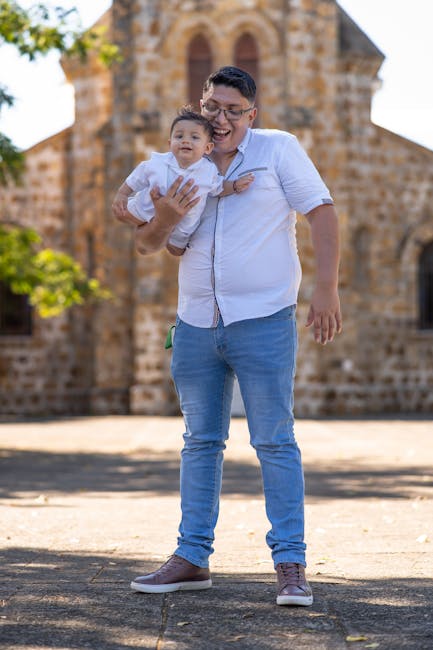Incorporating mindfulness into parenting can be a game-changer in your relationship with your children. It can transform the way you interact with your kids, making you more present, patient, and understanding. But how do you go about it? This comprehensive guide will provide you with practical tips and techniques to integrate mindfulness into your everyday parenting. Let’s dive in!
Key Takeaways
- Understanding the concept and benefits of mindful parenting.
- Core practices of mindful parenting and how to create a supportive environment.
- Developing essential skills in children through mindful parenting.
- Techniques and activities for mindful parenting.
- How to integrate mindfulness into everyday parenting.
Understanding Mindfulness in Parenting
Definition of Mindfulness
Mindfulness is the practice of being fully present in the moment, aware of your thoughts, feelings, and sensations without judgment. It’s about being in tune with yourself and your environment, focusing on the here and now.
Benefits of Mindful Parenting
Enhances emotional connection with children
Mindful parenting allows you to connect with your children on a deeper emotional level. It helps you understand their feelings and emotions, fostering a stronger bond.
Improves parenting effectiveness
Being mindful makes you more aware of your reactions and responses, enabling you to manage your emotions better. This leads to more effective parenting, with less stress and more joy.

Core Practices of Mindful Parenting
Be Present in the Moment
Avoid multitasking during family time
When you’re with your children, be fully present. Avoid distractions like checking your phone or thinking about work. Focus on the moment and enjoy the time spent with your kids.
Engage fully in activities with your child
Whether it’s playing a game, reading a book, or simply talking, engage fully in the activity. This shows your child that they are important and valued.
Listen with Empathy
Practice active listening
Active listening involves not just hearing, but understanding and responding to your child’s words. It shows that you value their thoughts and feelings.
Validate your child’s feelings
Recognize and acknowledge your child’s emotions. This helps them feel understood and supported, fostering emotional intelligence.

Creating a Supportive Environment
Set Boundaries and Limits
Importance of consistent rules
Consistent rules provide a sense of security and predictability for children. They know what to expect and understand the consequences of their actions.
How to set clear expectations
Be clear and specific about your expectations. This helps your child understand what is expected of them and reduces confusion and conflict.
Encourage Open Communication
Foster an atmosphere where thoughts and feelings can be shared
Create an environment where your child feels safe to express their thoughts and feelings. This promotes open communication and strengthens your relationship.
Techniques for open and honest dialogues
Use techniques like reflective listening and open-ended questions to encourage your child to share their thoughts and feelings. This helps you understand their perspective and fosters mutual respect.
Create a Nurturing Home
Importance of emotional security
A nurturing home provides emotional security for your child. They feel loved, valued, and safe, promoting their emotional and mental well-being.
Strategies to make your home a safe haven
Create a positive and supportive atmosphere at home. Encourage positive interactions, show affection, and provide comfort and support when needed.

Developing Essential Skills in Children
Encourage Independence
Allow children to make choices
Allowing your child to make choices fosters independence and decision-making skills. It also shows them that you trust and respect their judgment.
Teach problem-solving skills
Help your child develop problem-solving skills by guiding them through the process rather than providing solutions. This helps them become more confident and capable.
Promote Self-Awareness and Emotional Regulation
Techniques to help children understand their emotions
Help your child identify and understand their emotions. This promotes self-awareness and helps them manage their emotions effectively.
Strategies for managing emotions effectively
Teach your child techniques like deep breathing and mindfulness to manage their emotions. This helps them cope with stress and anxiety, promoting emotional well-being.
Foster a Growth Mindset
Teach the value of effort and persistence
Encourage your child to value effort and persistence over results. This fosters a growth mindset, promoting resilience and a love for learning.
Encourage learning from mistakes
Help your child see mistakes as learning opportunities rather than failures. This promotes a positive attitude towards learning and fosters resilience.

Mindful Parenting Techniques and Activities
Practice Self-Care
Importance of parental well-being
Your well-being directly impacts your ability to parent effectively. Taking care of yourself helps you be more present and patient with your children.
Self-care strategies for parents
Incorporate self-care into your daily routine. This could include activities like meditation, exercise, or simply taking time for yourself.
Mindful Breathing Exercises
Techniques for parents and children
Mindful breathing exercises can help both you and your child manage stress and anxiety. They promote relaxation and focus, enhancing your ability to parent mindfully.
Benefits of breathing exercises in stressful situations
Breathing exercises can help you and your child calm down in stressful situations. They promote relaxation and focus, helping you respond rather than react.
Gratitude Practice
How to incorporate gratitude into daily routines
Incorporate gratitude into your daily routine by expressing appreciation for the good things in your life. This fosters a positive mindset and promotes happiness.
Benefits of a gratitude mindset for parents and children
A gratitude mindset can enhance your relationship with your child. It promotes positivity and appreciation, fostering a stronger bond.
Mindful Discipline Strategies
Implementing discipline without emotional harm
Discipline should be about teaching, not punishing. Implement discipline strategies that are respectful and considerate of your child’s feelings.
Balancing firmness with kindness in discipline
Balance firmness with kindness in discipline. Be clear about your expectations and consequences, but do so in a way that is respectful and understanding.
Integrating Mindfulness into Everyday Parenting
Integrate Mindfulness into Daily Activities
Tips for mindful eating, playing, and learning
Incorporate mindfulness into daily activities like eating, playing, and learning. This makes mindfulness a natural part of your child’s day, promoting their well-being and development.
Making everyday routines opportunities for mindfulness
Turn everyday routines into opportunities for mindfulness. This helps your child develop mindfulness skills and promotes their well-being.
Embrace Short, Consistent Sessions
Fitting mindfulness into a busy schedule
Even short, consistent mindfulness sessions can be beneficial. Incorporate mindfulness into your daily routine, making it a natural part of your day.
Importance of regular, brief practices
Regular, brief mindfulness practices can be more effective than long, infrequent sessions. They help your child develop mindfulness skills and promote their well-being.
Mindful Parent-Child Activities
Ideas for activities that enhance bonding
Engage in mindful activities with your child. This enhances bonding and promotes mutual respect and understanding.
How these activities promote mutual respect and understanding
Mindful activities promote mutual respect and understanding by fostering open communication and empathy. They enhance your relationship with your child and promote their well-being.
Incorporating mindfulness into parenting can be a transformative experience. It can enhance your relationship with your child, making you more present, patient, and understanding. With these practical tips and techniques, you can start your journey towards mindful parenting today.
For more insights on mindful parenting, you can check out these resources: strategies for mindful parenting, mindfulness techniques for children, and the impact of practicing mindfulness on our ability to manage stress.
Sources:
– Sunshine City Counseling
– Michigan State University Extension
– Rooted Family
Gentle Guidance FAQ: Embracing Mindfulness in Your Parenting Journey
What is mindfulness in the context of parenting?
Mindfulness in parenting refers to being fully present and engaged with your child, with an open and non-judgmental mind. It involves paying attention to your parenting experience, your child’s needs, and your reactions in a given moment, without letting past worries or future anxieties take over. This approach helps in fostering a deeper connection with your child and responding more effectively to parenting challenges.
How can I start incorporating mindfulness into my parenting routine?
Begin by setting aside a few minutes each day to practice mindfulness yourself, through meditation, deep breathing, or simply observing your thoughts and feelings without judgment. As you become more comfortable with being mindful, start applying these principles during interactions with your child—listen attentively, observe their needs and emotions, and respond with presence and compassion.
Can mindfulness help with parenting stress?
Absolutely. Mindfulness can significantly reduce stress by helping you respond to parenting challenges with a calm and clear mind. It encourages you to handle stressful situations with grace, rather than reacting impulsively. By being present and mindful, you’re more likely to approach difficulties with a balanced perspective, which can reduce the overall stress of parenting.
What are some simple mindfulness exercises I can do with my child?
Engaging in simple mindfulness exercises with your child can be both enjoyable and beneficial. Try activities like mindful breathing, where you breathe together and focus on the sensation of air entering and leaving your bodies, or a sensory walk, where you pay close attention to the sights, sounds, and smells around you. These activities can help your child learn to focus and calm their mind.
How can mindfulness improve my relationship with my child?
Mindfulness strengthens the parent-child relationship by fostering empathy, patience, and understanding. By being fully present, you’re more likely to recognize and respect your child’s feelings and perspectives. This attentive presence builds trust and open communication, making your child feel valued and heard, which is crucial for a healthy relationship.
Is it possible to be mindful even when disciplining my child?
Yes, mindfulness can be particularly effective during discipline. It involves taking a moment to pause and breathe before responding to your child’s behavior, allowing you to act from a place of calm and reason rather than frustration or anger. This approach not only models self-control for your child but also ensures that the discipline is fair and focused on teaching rather than punishment.
How can I teach my child to be mindful?
Teaching your child to be mindful starts with your own practice. Children learn by example, so practicing mindfulness yourself can be a powerful teaching tool. Additionally, introduce mindfulness activities suited to their age, such as mindful coloring, listening to bell sounds, or practicing gratitude. Make these practices a regular part of your routine to help your child develop their mindfulness skills.
What if I struggle to be mindful all the time?
Being mindful all the time is not the goal, nor is it realistic. Mindfulness is a practice, and like any skill, it takes time to develop. Be patient and compassionate with yourself, acknowledging moments when you are not as mindful as you’d like to be. Remember, each moment is a new opportunity to choose mindfulness. Celebrating small successes and forgiving lapses are key parts of the journey.



